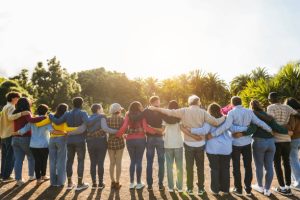Reflection Blog #1: Hyperlinked Communities
 What stood out to me most in this module was the idea that the purpose of using emerging technologies and innovative services is not simply to have the technologies or services, but the community that we foster with those technologies and services. Progress for the sake of progress isn’t the goal. Community is the goal. This tied in nicely with the idea presented in the Multnomah County Library video, that diversity for the sake of diversity isn’t good; equity and inclusion are the goals. Diversity is inevitable when you focus on equity and inclusion. In the same vein, progress is inevitable when you focus on community.
What stood out to me most in this module was the idea that the purpose of using emerging technologies and innovative services is not simply to have the technologies or services, but the community that we foster with those technologies and services. Progress for the sake of progress isn’t the goal. Community is the goal. This tied in nicely with the idea presented in the Multnomah County Library video, that diversity for the sake of diversity isn’t good; equity and inclusion are the goals. Diversity is inevitable when you focus on equity and inclusion. In the same vein, progress is inevitable when you focus on community.
I recently purchased a book called Mutual Aid: Building Solidarity During This Crisis (and the Next) by Dean Spade.  I haven’t read it yet, but it sits next to me as I’m writing this and it gives me the idea of marrying the ideas of mutual aid and library services. Many libraries are already doing this, like the Community Closet at the Capital Area District Libraries in Michigan mentioned in this module’s lecture. In Wholehearted Librarianship, Michael Stephens writes about the importance of understanding that meeting someone’s basic needs and offering them access to digital literacy programming are not mutually exclusive (2019). Both are important and we must find a way to focus on both. I would love to see a local mutual aid organization or group partnering up with the library to provide essential services. This connection would allow those who need basic items and assistance to also access library services that could help them long-term, like job services and education. Inversely, library users could access mutual aid services they may not otherwise have known were available to them. In Buckley’s Serving Homeless Patrons Info 281 course, I created a program for a mobile services caravan that would include library and reference services, basic healthcare, and a clothing closet. These services would be provided by collaborative efforts of the Missoula Public Library, the City-County Health Department, and the local YWCA’s Secret Seconds Thrift Shop. Services could be expanded as need and funding allowed, such as adding a mobile shower partner and food services. These services already exist in the area but bringing them together for mobile pop-ups around the city would expand access to more people.
I haven’t read it yet, but it sits next to me as I’m writing this and it gives me the idea of marrying the ideas of mutual aid and library services. Many libraries are already doing this, like the Community Closet at the Capital Area District Libraries in Michigan mentioned in this module’s lecture. In Wholehearted Librarianship, Michael Stephens writes about the importance of understanding that meeting someone’s basic needs and offering them access to digital literacy programming are not mutually exclusive (2019). Both are important and we must find a way to focus on both. I would love to see a local mutual aid organization or group partnering up with the library to provide essential services. This connection would allow those who need basic items and assistance to also access library services that could help them long-term, like job services and education. Inversely, library users could access mutual aid services they may not otherwise have known were available to them. In Buckley’s Serving Homeless Patrons Info 281 course, I created a program for a mobile services caravan that would include library and reference services, basic healthcare, and a clothing closet. These services would be provided by collaborative efforts of the Missoula Public Library, the City-County Health Department, and the local YWCA’s Secret Seconds Thrift Shop. Services could be expanded as need and funding allowed, such as adding a mobile shower partner and food services. These services already exist in the area but bringing them together for mobile pop-ups around the city would expand access to more people.
These are the kinds of ideas that inspire me and excite me about librarianship. The possibilities are endless with the right vision and creativity. Libraries are not about books, but communities.
American Library Association. (2019, June 17). Multnomah county library: Creating conditions for equity to flourish [Video]. YouTube. https://youtu.be/SKGlxh-zc0Y?si=OQzZvMcG56YD6lnq
Stephens, M. (n.d.). Lecture 5: Hyperlinked communities [Panopto]. https://sjsu-ischool.hosted.panopto.com/Panopto/Pages/Viewer.aspx?id=3eacdb23-84fd-49e5-9975-aef3014b3ed2
Stephens, M. (2019). Wholehearted librarianship. ALA Editions.
One Comment
Jenn
Hi, Amy,
I like your idea of marrying the ideas of mutual aid and library services and being intentional with library innovation. I agree with your statement at the beginning, that “Progress for the sake of progress isn’t the goal”. We can get so caught up in new and emerging technologies that we fail to check to see if our community would actually benefit from it. I love the idea of the community closet and providing food. This really needed right now with SNAP funding being cut.
-Jenn